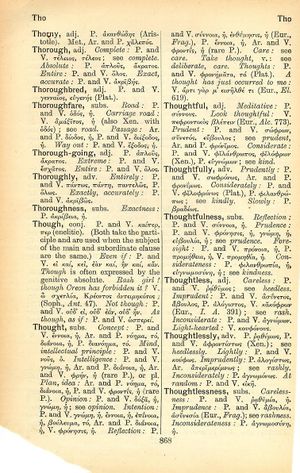though
From LSJ
Τὶ δὲ σὺ διά τὸν Θεὸν δύνασαι ἀρνηθῆναι; Οἷον δὲ μέτρον ἀγάπης τῶν ἀγαπώντων σε ἐστί; (Χρύσανθος Καταπόδης, Σχολὴ Ζωῆς) → ?
English > Greek (Woodhouse)
conj.
P. and V. καίπερ, περ (enclitic).
(Both take the participle and are used when the subject of the main and subordinate clause are the same.) Even if: P. and V. εἰ καί, κεἰ, ἐὰν καί, ἢν καί, κἄν.
Though is often expressed by the genitive absolute. Rash girl! though Creon has forbidden it? V. ὦ σχετλία, Κρέοντος ἀντειρηκότος; (Soph., Ant. 47).
Not though: P. and V. οὐδʼ εἰ, οὐδʼ ἐάν, οὐδʼ ἤν.
As though, as if: P. and V. ὡσπερεί.

